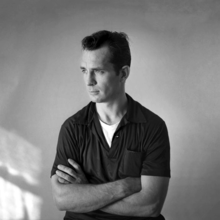The Revolt Against Essence
Getting to know the most popular philosophy of the 20th century

Consider these popular subjects from the twentieth century:
Zen
Jack Kerouac
J.D. Salinger novels
Forrest Gump.
Each of them is soaked in the philosophical school of existentialism. There are many other popular subjects that are either tinged with existentialism or downright soaked in it as well, ranging from Taoism to psychedelics to St. Therese of Lisieux to the postmodern philosophy of Michel Foucault.
All these things have proven popular to the western mind over the past 100 years. The question is, why?
I believe it's because existentialism might be the best individual response to our cultural condition.
What is It?
Experts often disagree about the definition of existentialism, but in general, the term refers to a type of thought that emphasizes existence rather than essence. Here's how Will Herberg put it in Four Existentialist Theologians:
“[G]enerally we can describe thinking as existentialist if it makes existence rather than essence the starting point of its ontological reflections.”

From ancient Greece through modern philosophy, it was widely accepted that essence took priority over existence. The general idea: in order to know something exists, you need to know its essence. Therefore, essence is prior to existence.
Essences are those things that define a class of things. If you find that thing that distinguishes one class from another, you've found its essence. For the class “elephant,” that thing might be its trunk. For humans, that thing is the rational faculty. Once you discern a trunk or a creature with a rational faculty, you identify the existence of an elephant or a human.
Essences, in other words, are fundamentally definitional. They define classes of things.
They can also bleed into, and become confused with, attributes that Aristotle called “accidents.” These are things that help define an individual within a class. Both essences and accidents are definitional. So:
The rational faculty on Person A: Essence.
The six feet of height on Person A: Accident.
Existentialism, on the other hand, frowns on definitions. It puts essence in second place.
Modern existentialism distrusts essences and accidents altogether. It dislikes words or categories that define people and urges people to break free of them.
It tells people, “don't worry about all those things that seem to define us as individuals – our job, our possessions, our reputation, our physical characteristics, our personality. Those things are secondary, or ancillary, things. Focus on the simple fact that you are; that you exist.”
“And screw essence.”
Because modern society suffocates under an array of essences – actual essences that define a class of things, artificial essences, definitions, accidents . . . whatever you want to call them – modern existentialism has proven wildly popular over and over and over again.
People, after all, don't like to suffocate.
Albert Camus
The whole attitude of existentialism is perhaps best seen in the most popular existentialist novel of the twentieth century, Albert Camus' The Stranger, which I'll summarize in hopes of providing a good “feel” for existentialism.

The hero of the story, a man named Mersault, is supposed to be the quintessential existentialist man. Nothing holds any meaning for him; he's indifferent to things most people value – family, love, social conventions, money, career. He goes through life with little thought of others; primarily because he gives little thought to himself. He just goes about and lets the events of life bounce off him, indifferent to any aspirations for himself, puzzled by aspirations in other people. When his mistress, for instance, asks if he loves her, he describes his response as follows: “I answered . . . that it didn't mean anything, but that I probably didn't love her.” When his mother dies, he obliges the social conventions – to sit at casket vigil for a day – but feels no remorse; he doesn't feel any annoyance at the vigil, either; he simply doesn't care either way.
This indifference gets Mersault sentenced to death. He becomes friends with a pimp named Raymond, who at one point beats his girlfriend, an Arab woman. The woman's brothers later attack Raymond in revenge while Mersault is with him, but are beaten back. Later, Raymond and Mersault see the Arabs again, and Raymond proposes to shoot them in cold blood. Mersault advises against it and convinces Raymond to give the revolver to him. Later Mersault is walking alone on the beach and, on the verge of heat stroke, sees one of the Arabs again. In order to get out of the sun, he walks towards the shade, which is in the Arab's direction; the Arab pulls a knife, and Mersault, in self-defense, shoots him.
At his subsequent trial, Mersault is convicted of murder. One of the primary pieces of evidence: his callousness at his mother's funeral. He must, the prosecutor convinces the jury, be a monster. He is sentenced to death. While awaiting his execution, the prison chaplain visits him and urges him to reconcile himself with Christ. Mersault, unsurprisingly, is indifferent to anything like religion or the after-life and doesn't see any sense in the chaplain's urgings. The minister doesn't relent until Mersault blows up at him, crying out that none of it makes any difference; all men are equally worthy; all men live under a sentence of death. It doesn't matter that his mother died; it doesn't matter if his girlfriend is now kissing another man. It all doesn't matter. In short, Mersault says the universe has no meaning in it, so how can all the things that people find so important matter?
Prior to his emotional explosion, Mersault was disturbed at his pending death. After it, he was calm. Camus makes it clear that Mersault, always the stranger, had finally become conscious of his existentialism, of why he was so indifferent to everything. As a result, Mersault could greet death, too, with indifference – and equanimity.
Mersault is the poster boy of twentieth-century existentialism. If you have a sense of his character – the detachment, the indifference – you have a notion about existentialism.
And what exactly is Mersault indifferent to?
He was indifferent to any attempt to categorize him, any desire to fit into a preconceived notion of how he should behave, any attachment to what people think about him.
In a word, he was indifferent to definition.
He simply existed, like a man in a white box room, just staring.
Mersault and Modern Society
I think Mersault's disposition appeals to the modern person. It appeals to the modern person because modernity is wrapped in essence. Modern society suffocates in essence and definitions. From the 1950s caricatured efforts to “keep up with the Joneses” to today's virtue signaling: modern culture is a culture of definition: defining oneself, letting others define you; putting on a definition for appearance's sake.
But while on the surface society is one of essence and definition, underneath, there's a cauldron of existentialism percolating.
The evidence is obvious. If you know what to look for. Repeatedly, existentialist themes erupt through the essentialist surface of society and grab our attention. The list from the beginning of this article is just a small sampling:
Zen
Jack Kerouac
J. D. Salinger novels
Forrest Gump.
I plan on exploring each these in more detail in future articles, but for now, a quick summary of each of their existentialist themes will have to suffice:
Zen arose when Mahayana Buddhism merged with Taoism. Buddhism is steeped in a thing called “monism,” which teaches that all things are one. Individual things don't exist; individual classes of things don't exist. There is, in other words, no essence at all. In this, Zen might be the most radical form of existentialism. Its techniques – whether quiet meditation or sudden enlightenment or koans – are all designed to get its practitioners beyond “subject-object” . . . beyond the separateness of all things and beyond all essence.

Jack Kerouac dripped Buddhism. He practiced dhyana, Buddhist meditation. He at times took vows to lead a Buddhist life. In one vow, he promised to limit his sexual activity to masturbation (apparently his idea of austerity), another time he vowed to eat only one meal per day and to write about nothing but Buddhism. He at times exclaimed, “I am Buddha,” and once asked the modern Zen master D.T. Suzuki if he could spend the rest of his life with him. His On the Road (just $1.99 on Kindle) is a portrait of a young man with zero concerns about essence-filled societal conventions.
J.D. Salinger's Holden Caulfield in The Catcher in the Rye punches and weaves through everyday banalities that most people embrace. He disdains the ballyhooed elite prep school he attends; he thinks little of money; he is nauseated by the forms of entertainment most people find enjoyable. He intuitively sees the shallowness of the things that are the cheap fodder of existence for most people. Holden is merely a watered-down, less radical, version of Mersault. Both are existentialist characters that pull away from a society that is filled with essences, accidents, and definitions . . . things that Holden finds confining and Mersault doesn't even condescend to acknowledge. Salinger would expand this theme in Franny and Zooey.
The movie Forrest Gump is a 142-minute lesson in how a man with an IQ of 75 can make it in a world . . . if he is an existentialist. Intelligence is needed to navigate the world of essence and definitions: to be clever, to manipulate, to plan, to scheme. None of that is for Forrest. He simply exists. He never even tries to marry or win over his beloved Jenny, but rather, simply accepts her as his “all,” with no reference to himself.
Forrest Gump is the lovable version of Camus' Mersault. Forrest is an everyday Zen master. Forrest is perhaps the most radical existential character in all of film and literature.
He is also the most popular movie character of all time, according to a recent massive fan poll.
His existentialism and popularity aren't a coincidence.
